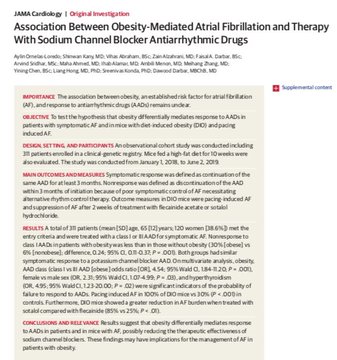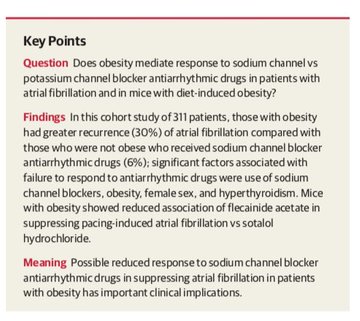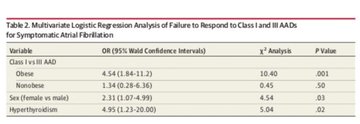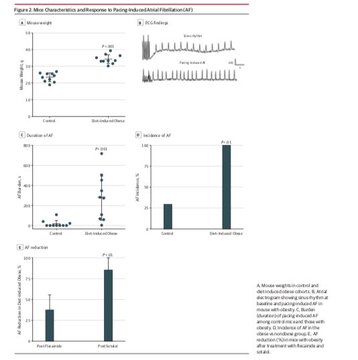New research suggests that obesity may reduce response to sodium channel blocker antiarrhythmic drugs for atrial fibrillation (AFib).
The researchers, publishing in JAMA Cardiology, explained that “the association between obesity, an established risk factor for AFib, and response to antiarrhythmic drugs remains unclear,” and sought to determine whether obesity mediated response to antiarrhythmic drugs in those with symptomatic AFib, and in mice with diet-induced obesity and pacing-induced AFib.
The observational study included 311 patients enrolled in a clinical registry, as well as mice fed a high-fat diet for 1- weeks. The researchers defined a symptomatic response as the continuation of the same antiarrhythmic drug for at least three months, with nonresponse defined as the discontinuation of the drug therapy withing three months of initiation due to poor symptomatic control of AFib that necessitates alternative rhythm control therapy. They defined outcomes measure in the mice as pacing-induced AFib and suppression of AFib after two weeks of treatment with flecaninide acetate or sotalol hydrochloride.
According to the study results, nonresponse to class I antiarrhythmic drugs in obese patients was less than those without obesity (30% vs. 6%, respectively; difference= 0.24; 95% CI, 0.11 to 0.37; P=0.001). The researchers reported that both groups showed similar symptomatic response to potassium channel blocker antiarrhythmic drugs. After multivariate analysis, obesity, arrhythmic drug (class I vs. III, P=0.001), female vs. male sex (P=0.03), and hyperthyroidism (P=0.02) were significant indicators of likelihood of nonresponse to antiarrhythmic drugs. In the mouse arm, pacing-induced AFib occurred in 100% of the mice with diet-induced obesity vs. controls (P<0.001), and there was a greater reduction in AFib burden within the group treated with sotalol compared with flecaninide (P<0.01).
“This is the first time anyone has shown that there is a differential response to antiarrhythmic drugs for AFib,” senior author Dr. Dawood Darbar, professor and head of cardiology at the University of Chicago College of Medicine, said in a press release. “As 50% of the patients in our AFib Registry are obese, this provided us with a unique opportunity to determine whether obesity affected response to drug treatment for AFib. Our study provides new information that physicians can use to guide their decisions for obese patients with AFib.”
Does #obesity regulate response to heart rhythm drugs for #AFib? Study suggests reduced effectiveness of drugsfor AFib in #obese patients https://ja.ma/339zLLWAssociation Between Obesity-Mediated Atrial Fibrillation and Sodium Channel Blocker Antiarrhythmics
This cohort study examines the use of class I and class III antiarrhythmic drug treatment of atrial fibrillation in patients with obesity.jamanetwork.com
Is there a role for more precise medicine in patients with #AFIB undergoing medical management? Association Between Obesity-Mediated Atrial Fibrillation and Sodium Channel Blocker Antiarrhythmics https://ja.ma/2QV0dGZAssociation Between Obesity-Mediated Atrial Fibrillation and Sodium Channel Blocker Antiarrhythmics
This cohort study examines the use of class I and class III antiarrhythmic drug treatment of atrial fibrillation in patients with obesity.jamanetwork.com
Fresh from @JAMACardio Obesity might differentially mediate AFmaking sodium channel blockers less helpful & possibly harmful for symptomatic control https://jamanetwork.com/journals/jamacardiology/articlepdf/2756247/jamacardiology_ornelasloredo_2019_oi_190078.pdf … #HEALTHYLIVING start @exerciseworks #epeeps #atrialfibrillstion #cardioed #echofirst #STOPSMOKING
How Obesity changes Response to Antiarrhythmic drugs in Afib. Do obese Pts need a different therapy vs non-obese? #EPeeps #cardiotwitter @EPeeps_Bot https://ja.ma/2snQ4Z6Association Between Obesity-Mediated Atrial Fibrillation and Sodium Channel Blocker Antiarrhythmics
This cohort study examines the use of class I and class III antiarrhythmic drug treatment of atrial fibrillation in patients with obesity.jamanetwork.com









No comments:
Post a Comment
Note: Only a member of this blog may post a comment.